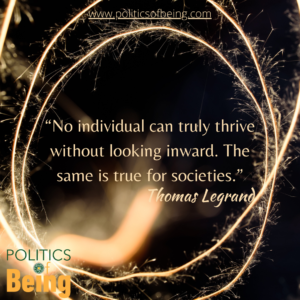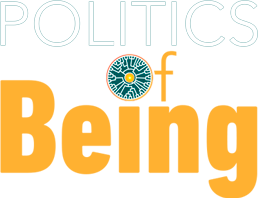
A Marriage of Wisdom and Science
“I propose throughout this book a marriage of wisdom and science. Scientific knowledge per se cannot determine what we should strive for, the values we should hold, and the desirable direction of our societies’ evolution. Hence we have lost our ways in the blind pursuit of economic and technological development as ends in themselves. We need wisdom to guide our nations, and the role of knowledge is to validate or reject (as erroneous applications or interpretations), specify, and operationalize wisdom’s general orientations. This wisdom is to be found in the traditions that cultivated it over centuries and millennia—allowing it to impregnate our cultures, an essential condition for its legitimate and effective use nowadays—and updated to our current realities through the scientific lens.
The vision I outline is largely inspired by the many wisdom traditions that have flourished everywhere on this Earth throughout history. Beyond what are often called spiritual and religious traditions, there are also philosophical traditions, especially those which have remained faithful to their etymology, the “love of wisdom,” and are thus, according to the definition I propose, “spiritual traditions,” a term I will often use in this book. Unfortunately, due to the course Western philosophy has taken, this is often no longer the case in the West, which is deeply connected to the current spiritual crisis.
In ancient Greece, philosophy was born as an art of living, a way of being, an effort of inner transformation that relied on spiritual exercises. Philosophical discourse was only a part of it. Anyone on the path of self-improvement or self-realization was a philosopher. All ancient philosophical schools warned against the natural tendency to get caught up in philosophical discourse, thus forgoing philosophy as a way of life. Greco-Roman philosophy was eventually absorbed by Christianity and shaped the Christian spiritual life, providing concrete exercises, models, and vocabulary. Christianity took over the spiritual role of philosophy and let what was then called “philosophy” become a mere theoretical, intellectual exercise, providing a conceptual basis for theology.
After the Middle Ages, “philosophy” progressively regained its autonomy over religion, inheriting many of the medieval features of abstract theology. Nowadays, philosophy is generally considered an art of thinking, concerned more with concepts and words than with discovering the essential laws and truth of our lives, and taught by university professors — the only ones with a claim to the title of “philosopher.” Moreover, contrary to the Middle Ages, philosophy’s lack of a spiritual dimension is often no longer balanced by religion nowadays. Spirituality has been confused with religion and somehow rejected by Western philosophy and modernity, something that has had important consequences on the evolution of Society.
While religions have sometimes been used to divide humanity, true spirituality brings people together. I have come to the conclusion that all spiritual traditions share a common wisdom, whose different colors and forms ultimately enrich our common humanity. My own limited experience has drawn me closer to some of them, particularly that of my own teacher, Zen Master Thich Nhat Hanh, which to a greater extent enlightens this book. This Earth wisdom, that can emerge from the discussion between different spiritual traditions, provides the basis, through a continuous dialogue with science and history, for the development of the politics of Being.
Spiritual traditions are humankind’s most valuable common heritage, able to offer a profound understanding of human nature, as well as practical knowledge and tools for inner, and ultimately social, development. In fact, spiritual wisdom is not only relevant to our inner lives but can be applied to all areas of life, in everything we do, as spiritual teachers often embody. As societies reflect the psychological, emotional, and spiritual patterns and challenges of the individuals they are composed of, they, like individuals, can benefit from spiritual understanding and guidance. No individual can truly thrive without looking inward. The same is true for Societies.
This reflection is also informed by science. Throughout this book, I will also cover recent developments in many fields of human science, in particular political science, economics, sociology, anthropology, psychology, biology, and development studies, with endnotes and references for readers who want to go deeper. I refer to a wide range of countries as examples, with some emphasis on France, my own country, and the United States, on which a wealth of data is available to document our views. The US is probably the country that has fallen farthest into the old materialistic and individualistic paradigm—what can be called the “story of separation” (see chapter 2) and the emphasis on economic development. Hence, the US exemplifies the troubles associated with this approach and the need to transition to the new paradigm of being.
I first thought about writing this book as a pure, objective, and science-based proposal like the ones I write for UN agencies or governments, and this book can provide the basis for that. However, I realized something fundamental would be missing. I reclaim it by interweaving science and spirituality, inspiration and hard facts, theory and practice, including those from my personal experience. We cannot divide ourselves, mind and heart, when addressing the subject of human evolution. Wisdom, deep understanding, and intelligence do not arise from our thinking mind alone. Still, it needs to relate to our existing body of scientific knowledge, which provides a common ground for any relevant discussion beyond narrow spiritual circles.
The vision I outline is largely inspired by the many wisdom traditions that have flourished everywhere on this Earth throughout history. Beyond what are often called spiritual and religious traditions, there are also philosophical traditions, especially those which have remained faithful to their etymology, the “love of wisdom,” and are thus, according to the definition I propose, “spiritual traditions,” a term I will often use in this book. Unfortunately, due to the course Western philosophy has taken, this is often no longer the case in the West, which is deeply connected to the current spiritual crisis.
In ancient Greece, philosophy was born as an art of living, a way of being, an effort of inner transformation that relied on spiritual exercises. Philosophical discourse was only a part of it. Anyone on the path of self-improvement or self-realization was a philosopher. All ancient philosophical schools warned against the natural tendency to get caught up in philosophical discourse, thus forgoing philosophy as a way of life. Greco-Roman philosophy was eventually absorbed by Christianity and shaped the Christian spiritual life, providing concrete exercises, models, and vocabulary. Christianity took over the spiritual role of philosophy and let what was then called “philosophy” become a mere theoretical, intellectual exercise, providing a conceptual basis for theology.
After the Middle Ages, “philosophy” progressively regained its autonomy over religion, inheriting many of the medieval features of abstract theology. Nowadays, philosophy is generally considered an art of thinking, concerned more with concepts and words than with discovering the essential laws and truth of our lives, and taught by university professors—the only ones with a claim to the title of “philosopher.” Moreover, contrary to the Middle Ages, philosophy’s lack of a spiritual dimension is often no longer balanced by religion nowadays. Spirituality has been confused with religion and somehow rejected by Western philosophy and modernity, something that has had important consequences on the evolution of society.
While religions have sometimes been used to divide humanity, true spirituality brings people together. I have come to the conclusion that all spiritual traditions share a common wisdom, whose different colors and forms ultimately enrich our common humanity. My own limited experience has drawn me closer to some of them, particularly that of my own teacher, Zen Master Thich Nhat Hanh, which to a greater extent enlightens this book. This Earth wisdom, that can emerge from the discussion between different spiritual traditions, provides the basis, through a continuous dialogue with science and “history, for the development of the politics of being.
Spiritual traditions are humankind’s most valuable common heritage, able to offer a profound understanding of human nature, as well as practical knowledge and tools for inner, and ultimately social, development. In fact, spiritual wisdom is not only relevant to our inner lives but can be applied to all areas of life, in everything we do, as spiritual teachers often embody. As societies reflect the psychological, emotional, and spiritual patterns and challenges of the individuals they are composed of, they, like individuals, can benefit from spiritual understanding and guidance. No individual can truly thrive without looking inward. The same is true for societies.”
An excerpt from the Introduction of the book, Politics of Being
